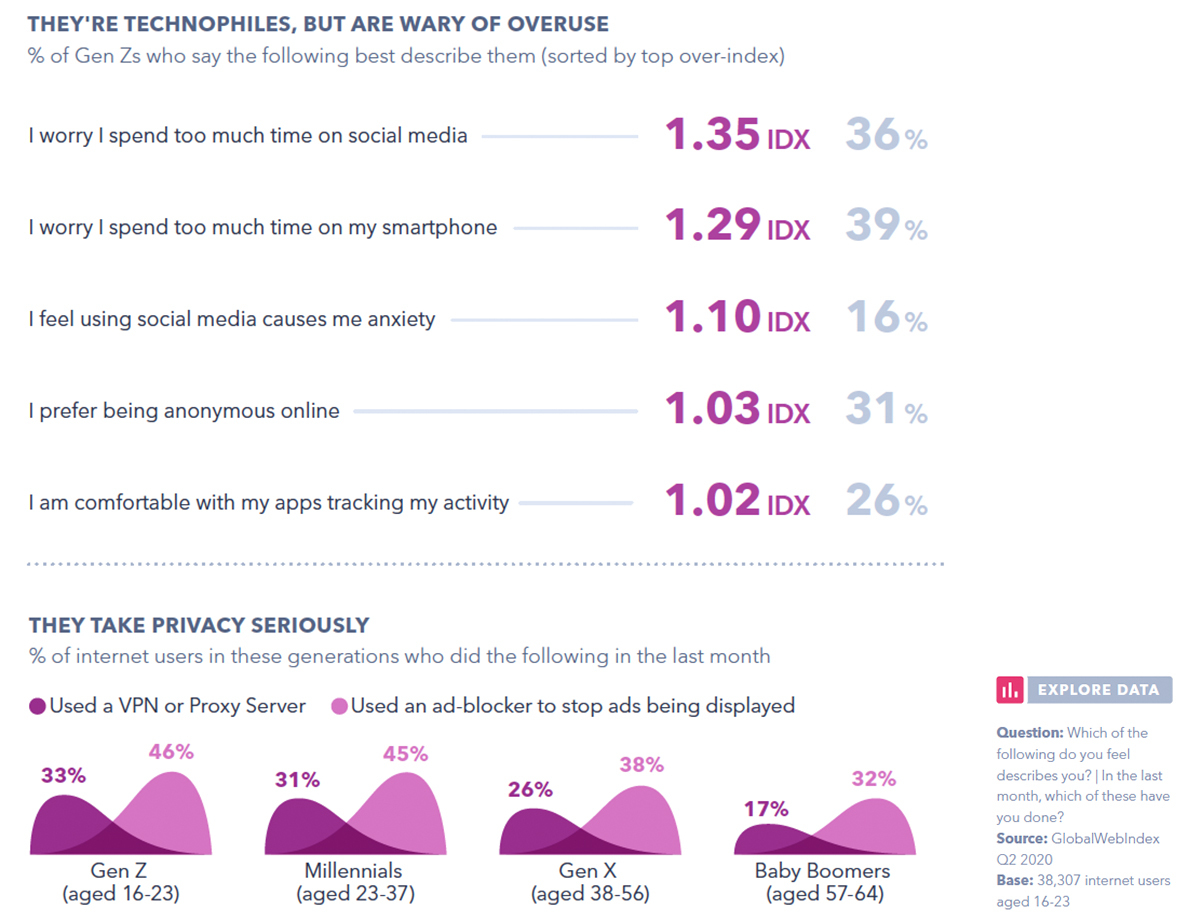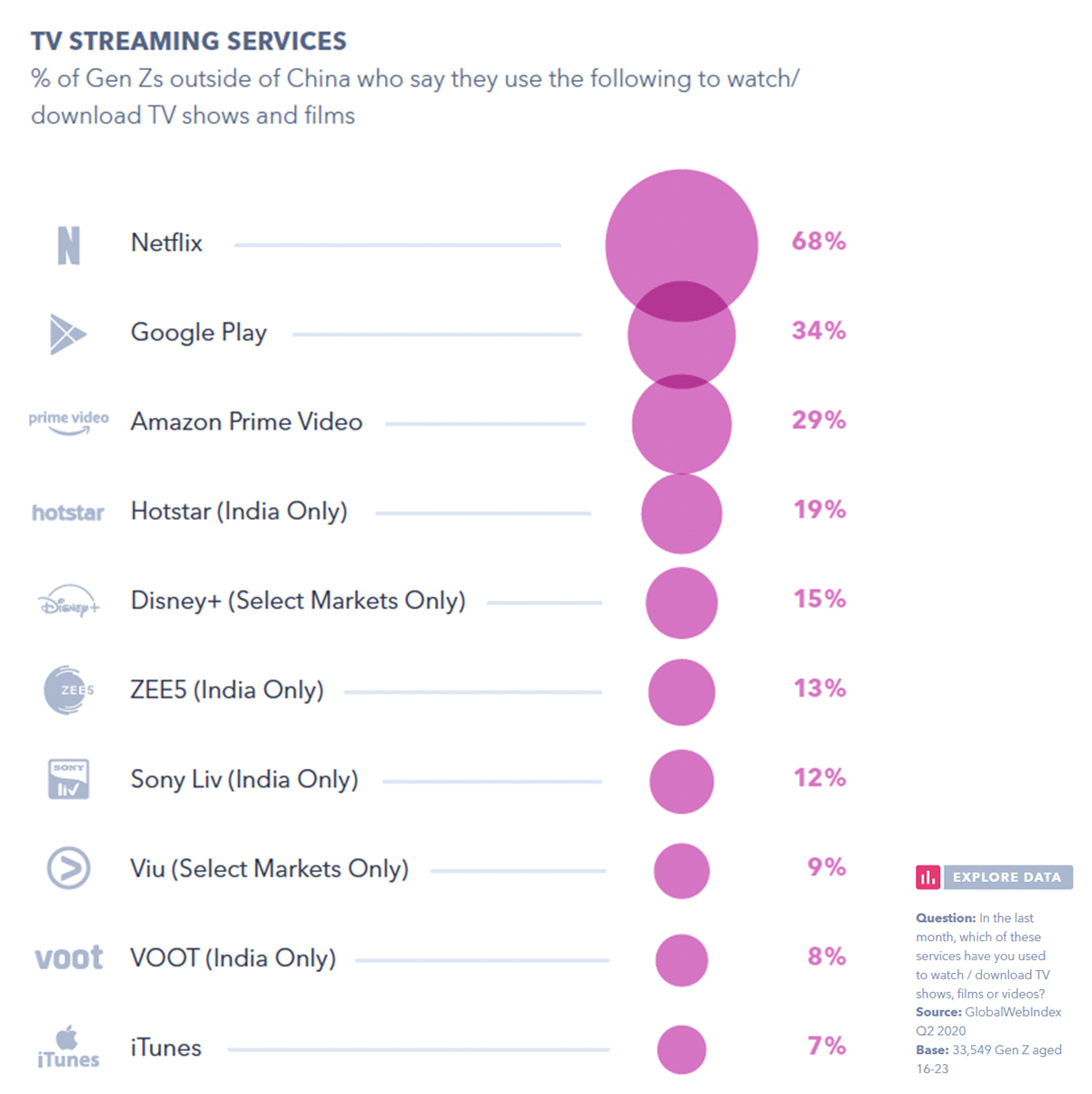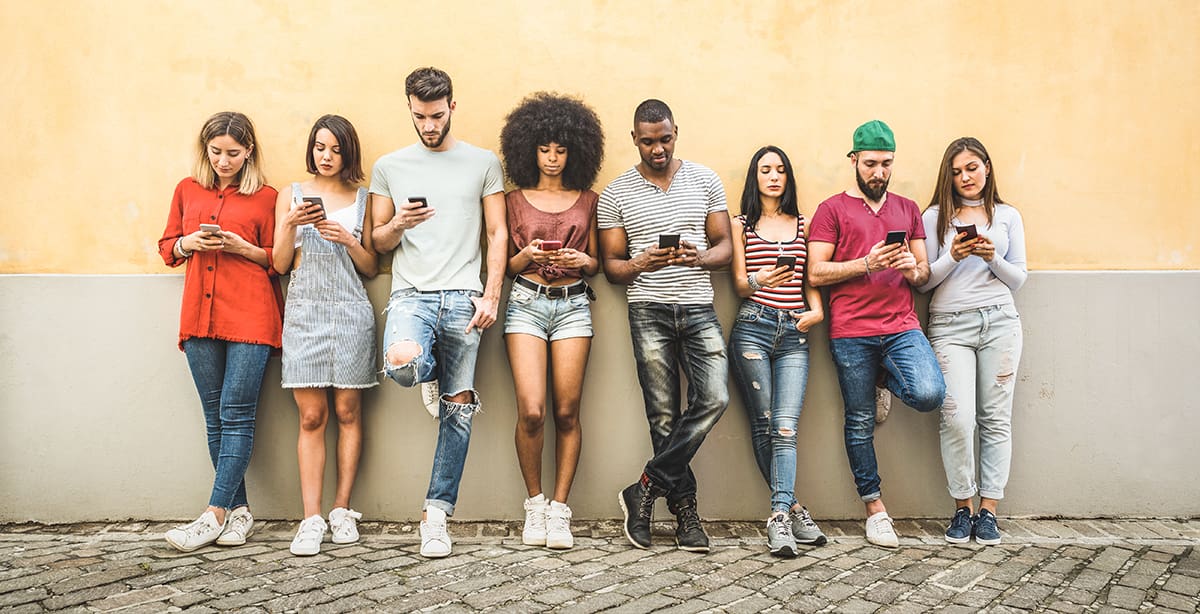They’re technophiles, with a conscience.
Generation Z, like Millennials before them, gets its share of screen time. Yet while they swipe, tap, like, and share, they’re aware of how much attention their tech is getting. Gen Z is active online but wary. Interacting, but guarded.
Due to our relationship with GlobalWebIndex, an innovative and leading market research SaaS company we at The Brandon Agency have been able to gather some insightful data on Generation Z, whose birth years fall around the late 1990s to mid 2010s. Here, we explore Gen Z’s media consumption habits and what makes them different from other consumer segments.
Gen Z is more averse to overconsumption of media, especially on electronic devices. To market to them is different than their less-restrained predecessors.
How can brands seize on the intentional time Gen Z spends consuming media and also respect their protective stance on privacy issues is critical to successfully marketing to them.
Craddock Close is a Social Media Associate at The Brandon Agency. He says he considers what they’re asking for before opting in.
“I am much more reluctant to share my phone number online than my email address,” Close said. “When sharing my phone number, I get tons of calls and texts. They turn into spam-like phone calls that are tough to avoid. When I give my email address online it is much easier to see who is sending the message. I can see what they are offering, and I can mark as spam or unsubscribe if I am not interested. It is much less intrusive.”
Also – what’s to gain? It’s got to be of value. “I am more likely to share when shown the incentive rather than a generic discount code,” Close said.
Let’s break down Gen Z’s relationship with tech and what it means to brands and agencies that market for them.
What is a technophile?
Any avid technology user is a technophile. Prior generations develop this affinity. In the case of Gen Z, it’s native. No technique to learn, no protocol to adjust to. Since their earliest memories, Gen Z has had touchscreen devices and smart features. That’s a factor in their media consumption as they reach adulthood.
How does Gen Z use technology?
The younger the person – the higher likelihood there’s a tech device in their hands.
It’s been woven into their fabric – some 44% of which say they’re comfortable with the latest technology. Roughly the same percentage of Millennials say the same. But Gen Z appears more aware of how they interact with tech – and where to establish limits.
Lizzy Smith is a Junior Art Director at The Brandon Agency. She’s seen the need to adjust her social media habits, especially as the pandemic unfolded.
“There was nothing else to do when being stuck in my house except watch Netflix and go on social media,” Smith said. “I actually do have a limit on my screen time because of that! I have an hour limit set for Instagram and Facebook and it’s made a huge difference. Instead of scrolling, I now use that time to read or go for walks.”

They’re also not in denial that social media and smartphones can be detrimental to one’s health. Gen Z is 10% more likely than the rest to admit social media causes them anxiety.
Previous generations are notorious for oversharing personal information. Gen Z is hard-pressed to share with a brand online. No matter what free e-Book, T-shirts, or secrets revealed they get.
They’re prone to browse anonymously and take extra steps to control their privacy more than other generations. They might even help their parents or grandparents review that Facebook privacy policy or filter spam email from filters that pile up with every contest giveaway.
Brianna Young laughs when asked if she helps her parents and older family members. “All the time,” she said.
“It’s iPhone tech things like how to use email and turn off notifications, things like that,” Young said. “The list is so long. Or even remembering passwords to different streaming services.”
They themselves grapple with what the balance should be between screens and IRL. Fewer than 40% say they consider social media a good thing for society. Yet, 25% use technology to support their mental wellbeing, and a third do so through social media.
Smith might see indications a friend needs a friend in a post – but she’ll go offline to help.
“I will always either text someone or meet with them,” Smith said. “It’s more personal than responding to a post,” Smith said. “Especially if someone posts about something they’re struggling with. I will make an effort to text and reach out to them.”
Lots of Gen Zers are content with a good smartphone, a laptop, or a tablet. Previous generations kept a much larger device portfolio. But you can’t beat the latest smartphone for everything you need.
That is unless you’re locked in a bit more because of a pandemic.
Gen Z, meet the PC. A spike in time at home has meant more screen time on more stationary devices, such as laptops and PCs. In Q1 2020, they spent an average of 3.25 hours on PCs and laptops. By Q2, that had increased to more than 3.5 hours.
What about now? Usage is leveling out. Early data portrays a likely drop to levels of use consistent with pre-pandemic days. So – marketing to Gen Z through a lens for mobile devices remains an effective strategy.
Inside Gen Z streaming habits
All this leap in screen time applies to television, too.
Four in 10 stream content at least 4 to 5 times a week. Research from March to July on COVID-19 impacts showed 60% of Gen Zs in 13 markets streamed more movies and shows in that period. That’s about 1.5 hours a day – 50% on PCs and laptops, 42% on mobile devices.
Lizzie Gustafson, a Media Coordinator at The Brandon Agency, enjoys streaming services. She subscribes to Amazon Prime TV, Hulu, and Netflix. Cable doesn’t make sense for a light TV watcher like her.
“When I do watch TV it is mindless and background noise,” Gustafson said. “I will watch shows like Survivor and Chopped on Hulu. Sometimes I will watch movies on Netflix when I am having a low key night.”

Gen Z is more efficient in its viewing habits than prior generations. Instead, streaming services deliver what they want, when they want it. Half of Gen Zers say they watch consecutive episodes of favorite shows. Translation: They’re frequent binge-watchers.
This trend says much about how a brand can reach Gen Z right where they live.
The way to reach Gen Z
An ambiguous giveaway isn’t compelling enough for Gen Z to offer up their personal data. It’s not worth the trade. 25% say they feel in control of their data online. 60% would rather keep their details to themselves than swap them for free services.
This model of data-capture-for-freebies won’t yield the same results as before.
Haywood Brandon is an Account Manager for The Brandon Agency. For his clients, he’s seen promising trends in a shift in marketing theory for Gen Z.
“They may not be our direct target audience,” Brandon said. “But it’s crucial to take the time to think about how they consume media. Gen Z loves content on all levels and wants to engage, regardless of the quality. Like on TikTok.”
There’s a lot more plant-and-cultivation with marketing messages, Brandon said. He has a unique perspective on the Millennial-Gen Z split, born in the gap in 1996 – he’s consumed media like this his whole life. Now, he’s educating his clients on it all.
“We’ve shown clients ways they can begin to plant seeds,” Brandon said. “When (Gen Zs) make purchases, they carefully consider our brands.”
Ready to plant seeds with an up-and-coming demographic with increasing buying power? Discuss your challenges with The Brandon Agency. We’re ready to find the solutions that fit your brand best. Reach out today.
